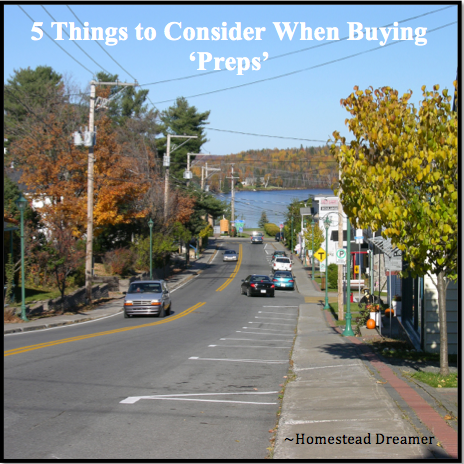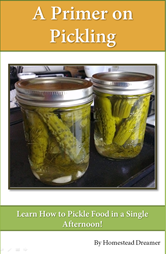So many people end up buying things they really don’t need or will ever use when they first start out on the path of preparedness. We fell into the loop of needing to buy ‘stuff’ to be prepared, only to find out 6 months down the road that what you got was not really needed, practical, or very useful overall.
 It really stings when you didn’t have the money to spend in the first place but believed the purchase to be a good investment. Through trial and error, we have learned A LOT and have been able to make better purchases for items we actually need.
It really stings when you didn’t have the money to spend in the first place but believed the purchase to be a good investment. Through trial and error, we have learned A LOT and have been able to make better purchases for items we actually need.
In my efforts to help people make educated, well informed decisions (and save money doing it), I offer you here the 5 things to ask yourself before you buy any prepping gear/items.
- Can I make it myself? This should always be the very first question. A great example I can give is saw horses. We find ourselves in need of a good pair of saw horses during our various projects in the garden but just one is $70 here so with tax and all, you are looking at $150 for a set. That is far beyond our budget capabilities right now but we have a real need. Well, we happen to have a bunch of smaller cut trees on the property we live on that is just laying around. We have the tools needed (both electrical and hand-tools) to make them and I went researching on how to build one. Next weekend, we plan on building a set that will cost us next to nothing (other than time and some screws). The cost of the power tools isn’t counted because they are an overall investment.
- Price versus use. If an item is cheap and you will only use it once, it may be worth the purchase. Emergency ‘space’ blankets would be a good example of this. If an item is expensive and you may only use it a few times over the course of your lifetime, you may want to rethink your need before you buy (and see #1, too!). Going back to the power tools as an example: We paid a goodly amount for our handheld skill saw and when we were considering the purchase, I asked Mr. Dreamer about how much it would actually get used. We were looking at buying one to speed a project up (re-roofing the greenhouse) and I was worried about paying over $200 for something we may only use a few times. He pointed out to me that we had a need for it even before we moved to our own property. Once we are able to buy our own place, the need for the saw would only increase. When we move, we already have some of the tools to build our dream with!
 Learn how to pickle food in a single afternoon! “A Primer on Pickling” is now available on Kindle for less than a latte!
Learn how to pickle food in a single afternoon! “A Primer on Pickling” is now available on Kindle for less than a latte!
- Am I really going to use this? Some would argue that this should be #1 on my criteria here but I counter with this: If you are already considering purchasing something, generally speaking there is a need. What you need to determine is if you need it just for now or longer. There is no point in buying some gear or gadget if you never intend to use it, “until IT happens” (whatever IT is) because should you find yourself in a SHTF situation and go to use the item you bought, you won’t know how to use it and it is worthless. Likely there will be little time to sit down and read instructions to learn how to use it. The value is pretty much non-existent at that point. Maybe you could trade it for something you actually need and know how to use.
- Multi-Purpose. When buying ‘prepper’ gear or other survival items, we always consider how many uses we can get out of the item in question. Can it be used (safely and without breaking it) in other projects or situations other than the originally intended design? We call it a “leatherman purchase” because it is useful for more than one thing. A “leatherman purchase” can change perspective on the value of what you are thinking about buying. If an item is more expensive than you would normally want to spend, consider just how much use you could really get from it? If an item is expensive but will also end up being used daily for extra duty, it may be a wise purchase.
- How long will it last? Given the topic we are discussing here – Buying Preps – quality is a big issue. Some go for the most expensive item on the market, assured that the more they spend, the better the item must be. Others end up going to the dollar store for a can opener that will end up breaking before the first can is fully opened. There has to be an educated balance and you can get that through reviews. Do not trust only Amazon’s reviews, be sure to check multiple sites and spend the extra time. I have come across items that have a huge fail rate for the most expensive model while the mid-range price was reported to last for years of hard use.
If you keep these things in mind before you actually purchase items, you will find yourself making smarter choices. Your dollar will stretch and the investment will (hopefully) pay off more than originally expected! By following these guidelines, buyer’s remorse and “oops!” moments are also reduced. Feel free to share some thoughts in the comments below or head back to my Facebook page to leave a comment there. I really hope it helps!




Great advice…and lastly – always look for a great deal once you determine your needs! Check out our website to see if we can save you some $$ http://www.discountpreparedness.com
Thank you Jane. A good deal is definitely the next step in the process!
Also might want to consider if ur buying for after shtf..can it be used without electricity?
Hubby works in commercial construction…his company will purchase needed tools and take a set amt out of each paycheck…one way to look at obtaining tools…not cheap, but better than the big cost all at once…and since he’s been working for same company for years, they have no problem with allowing these purchases…
Not the most ideal set up but there is value in it, too! Good, quality tools are always needed. Thank you for the comment grammyprepper!